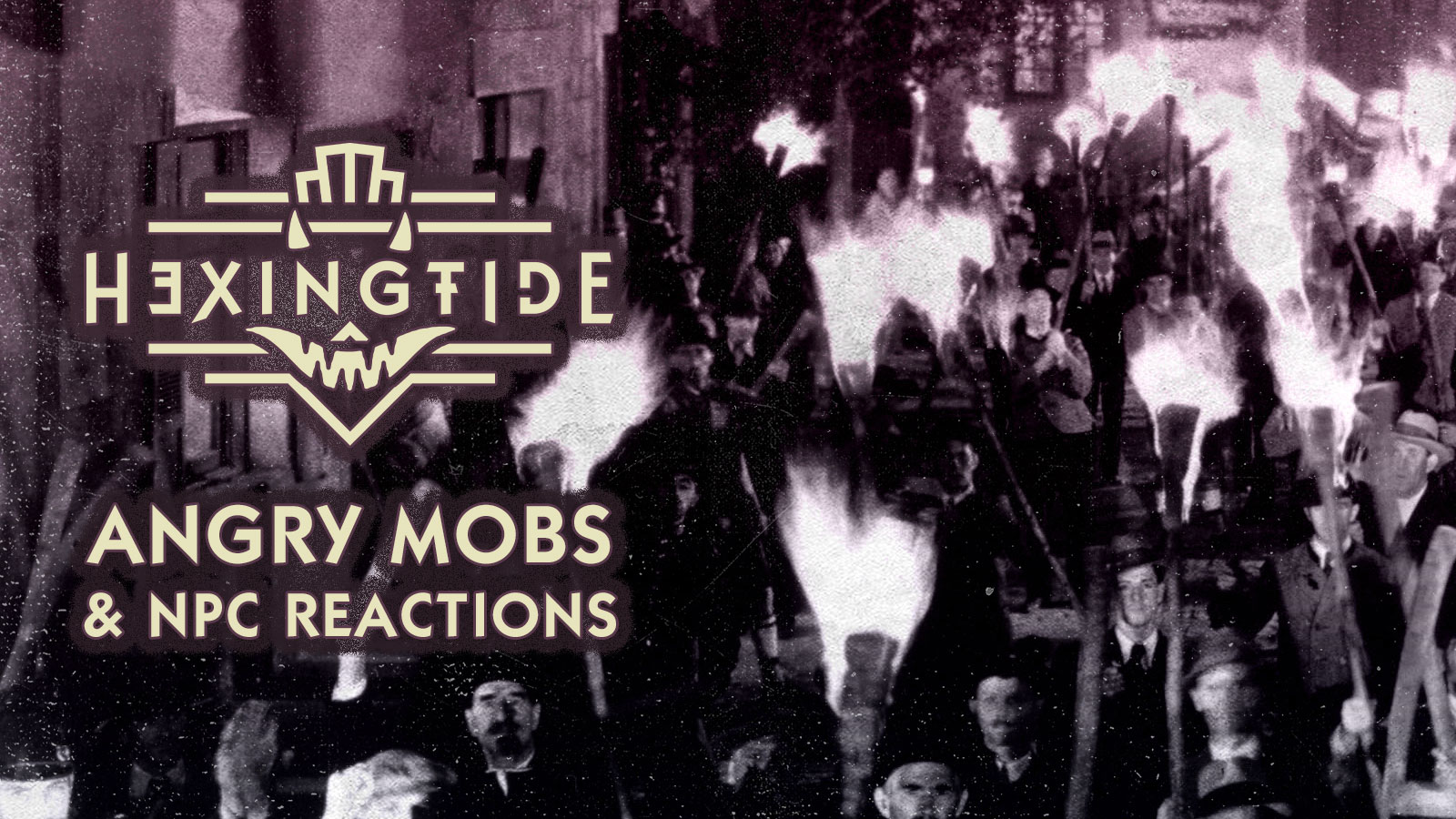I’ve been playtesting Hexingtide, my TTRPG of Minimalist Monstrous Roleplaying, pretty intensely this year. (While you’re here, download the in-development rules for free and sign up for playtesting!)
Over the course of these sessions, I’ve been pleased at how the existing rules support stories about monsters and other not-quite-human protagonists get into adventures and grapple with their inhumanity.
But a gap in the theme has emerged.
While the rules address the experience of the monster heroes own, internal struggles, the question of “how are these characters perceived by normal humans?” has been left to the GM to handwave or narrate.
Angry mobs and people freaking out at the site of these inhuman figures are a key part of these stories. These moments deserve a spot in the rules.
The challenge? How do we:
- Give this a mechanical procedure while keeping it rules-lights?
- Leverage the existing systems already in Hexingtide?
Mobs and Mundane Reactions
(This is a first draft – and written in the context of being placed in the rules. If you’re missing that context, download the current playtest rules. It’s a 32px zine format and rules-light, so it’s not a big commitment to scan through. Or wait until Playtest 0.3 drops to see these rules in-book, in-context.)
As a result of their very natures, the Players Characters draw unwanted attention towards themselves when interacting with the everyday, hum-drum world humanity. This is wholly separate from whatever inherent Portents they must contend with otherwise.
When a Player Character first is observed by or interacts with mundane humans (who are not otherwise involved with the larger world of myth and monsters), make an Isolation Power Check as follows:
- If the Player Character has not used one of their Powers or revealed their inhuman nature: roll the Isolation die as-is.
- If the Player Character is recognized as something other than a baseline human, most often by using a Power: roll the Isolation die + the relevant Power (i.e. as a standard Power Check).
- If multiple party members are involved, the Player Character taking initiative – or the most conspicuously not-human – makes the Check.
The result becomes the starting score of a new Portent with a Max of 10, based on one of the following three categories, as determined by the GM:
- Fear: The classic scene of an angry mob with pitchforks and torches – or terrified shrieks of hysteria.
- Denial: This may range from the blank stares of cognitive dissonance to the deliberate choice to shun and ignore the PCs.
- Wonder: For some, their response is one of curiosity – even awe. This presents a wholly different sort of problem to the PCs: annoyance and attention from NPCs who will not leave them alone!
This Portent remains present until the end of the Scene. The GM may choose to have it persist into subsequent Scenes or upon the next appearance of that NPC. Unlike other Portents, it must be Checked each round as the PCs act.
When these Portents reach their Max, the results is the same as other Portents: chaos erupts, the Protagonists’ plans are stymied, and they must deal with the resulting angry mob, closed doors, or fascinated mass following their every step.
Gameplay Example
Doughboy uses his +2 Hulking Size & Strength to barrel into a ghoul trying to escape out the end of the shadowed alleyway. He is successful, but in doing so, his momentum carries him – and the inert form of the undead creature – into the light of the city park at the end of the alley.
The rest of the party are right behind Doughboy, but he’s out in the open and all alone.
The Catholic schoolchildren playing in the park all stop and stare. Eyes wide open. Mouths agape. The nuns cross themselves, waiting for what happens next.
The GM asks Doughboy’s players to make an Isolation Check. Since he just used his +2 Size, the player will add that to his roll’s result. Doughboy has a d10 Isolation. He rolls a 4, plus 2 from the Power, for a total of 6.
The GM creates the resulting new Portent – and uses the player’s roll for its starting score: “Terrified, Inconsolable Children & Nuns 6/10.”
Whatever happens from here, the Party will have to deal with the Portent of the children and nuns causing all hell to break loose if they linger too long or mishandle the situation.
I’ll playtest these rules over the next month and, assuming all goes well, will incorporate them into the next playtest release. Speaking of:
What’s Next for Hexingtide?
I’ll soon post an update on end-of-year plans for Hexingtide and what to expect in the next major playtest release.
Until then, know that the rule’s Public Playtest 0.3 should go live in December. I’ll be scheduling more public playtests around the end of the year into Jan -Feb.
I’m also happy to share that Hexingtide will be featured in two upcoming TTRPG productions:
- Nov 2nd & 9th with Damn Good Games: This is a two-part show first live streamed on their Twitch, then uploaded to Anchor and Youtube. We’ll start with an interview, then go through character creation, before I GM a one-shot adventure!
- December: The crew from Table It! will be reviewing Hexingtide, and then running a Hexingtide adventure, which I’ll be joining as a player! These episodes should drop in December.

